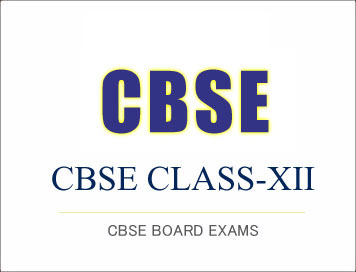CBSE Class-12 Syllabus 2018-19 (English Core)
Disclaimer: This website is NOT associated with CBSE, for official website of CBSE visit - www.cbse.gov.in
CBSE Class-12 Syllabus 2018-19 (English Core)
Background
Students are expected to have acquired a reasonable degree of language proficiency in English by the time they come to class XI, and the course will aim, essentially, at promoting the higher-order language skills.
For a large number of students, the higher secondary stage will be a preparation for the university, where a fairly high degree of proficiency in English may be required. But for another large group, the higher secondary stage may be a preparation for entry into the world of work. The Core Course should cater to both groups by promoting the language skills required for academic study as well as the language skills required for the workplace.
Objectives
The general objectives at this stage are:
to listen and comprehend live as well as record in writing oral presentations on a variety of topics
to develop greater confidence and proficiency in the use of language skills necessary for social and academic purpose
to participate in group discussions, interviews by making short oral presentation on given topics to perceive the overall meaning and organisation of the text (i.e., the relationships of the different "chunks" in the text to each other
to identify the central/main point and supporting details, etc., to build communicative competence in various registers of English
to promote advanced language skills with an aim to develop the skills of reasoning, drawing inferences, etc. through meaningful activities
to translate texts from mother tongue(s) into English and vice versa to develop ability and knowledge required in order to engage in independent reflection and enquiry
At the end of this stage learners will be able to do the following:
read and comprehend extended texts (prescribed and non-prescribed) in the following genres: science fiction, drama, poetry, biography, autobiography, travel and sports literature, etc. text-based writing (i.e., writing in response to questions or tasks based on prescribed or unseen texts) understand and respond to lectures, speeches, etc.
write expository / argumentative essays, explaining or developing a topic, arguing a case, etc. write formal/informal letters and applications for different purposes write items related to the workplace (minutes, memoranda, notices, summaries, reports etc. filling up of forms, preparing CV, e-mail messages., making notes from reference materials, recorded talks etc. The core course should draw upon the language items suggested for class IX-X and delve deeper into their usage and functions. Particular attention may, however, be given to the following areas of grammar:
The use of passive forms in scientific and innovative writings.
Converting one kind of sentence/clause into a different kind of structure as well as other items to exemplify stylistic variations in different discourses modal auxiliaries-uses based on semantic considerations.
Specific Objectives of Reading
Students are expected to develop the following study skills: refer to dictionaries, encyclopaedia, thesaurus and academic reference material select and extract relevant information, using reading skills of skimming and scanning understand the writer's attitude and bias comprehend the difference between what is said and what is implied understand the language of propaganda and persuasion differentiate between claims and realities, facts and opinions form business opinions on the basis of latest trends available comprehend technical language as required in computer related fields arrive at personal conclusion and comment on a given text specifically develop the ability to be original and creative in interpreting opinion develop the ability to be logically persuasive in defending one's opinion making notes based on a text Develop literary skills as enumerated below: personally respond to literary texts appreciate and analyse special features of languages that differentiate literary texts from non-literary ones explore and evaluate features of character, plot, setting, etc. understand and appreciate the oral, mobile and visual elements of drama identify the elements of style such as humour, pathos, satire and irony, etc. make notes from various resources for the purpose of developing the extracted ideas into sustained pieces of writing
Listening and Speaking
Speaking needs a very strong emphasis and is an important objective leading to professional competence. Hence, testing of oral skills must be made an important component of the overall testing pattern. To this end, speaking and listening skills are overtly built into the material to guide the teachers in actualization of the skills. Specific Objectives of Listening Students are expected to develop the ability: to listen to lectures and talks and to be able to extract relevant and useful information for a specific purpose. to listen to news bulletins and to develop the ability to discuss informally on a wide ranging issues like current national and international affairs, sports, business, etc. to respond in interviews and to participate in formal group discussions.
to make enquiries meaningfully and adequately and to respond to enquiries for the purpose of travelling within the country and abroad.
to listen to business news and to be able to extract relevant important information. to develop the art of formal public speaking.
Click Here To Download Full Syllabus
Courtesy: CBSE
